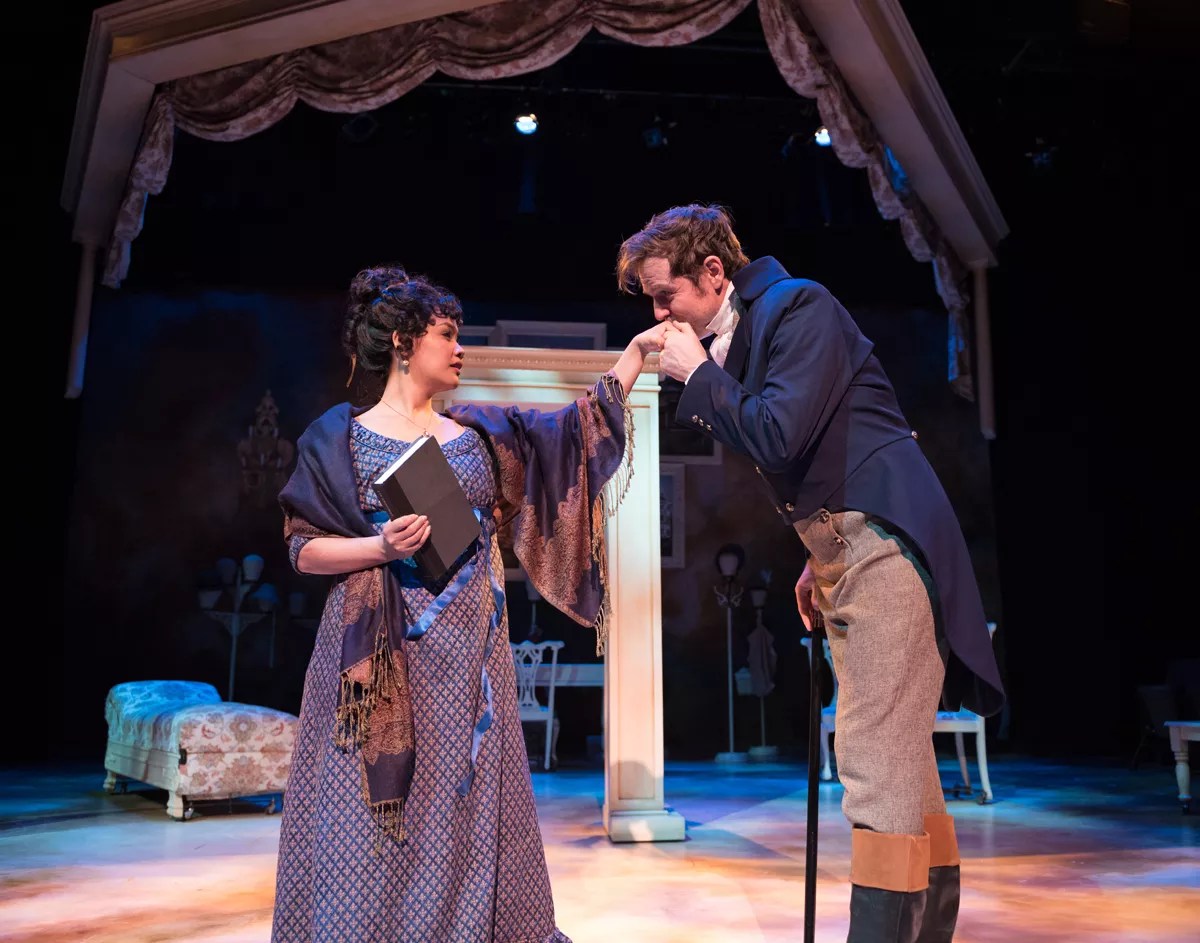
Matt Gale Photography

Audio By Carbonatix
Kate Hamill’s Sense and Sensibility, now at the Arvada Center’s Black Box Theatre, isn’t the Jane Austen you’re used to, those gracefully written novels filled with a sly, quiet humor, subtle bons mots and canny observations about late eighteenth-century society. Yet in many ways this staged version is faithful to its source. The play follows the book’s plot closely, simplifying only enough to fit the narrative into a two-hour time frame. The visual elements are stylish and beautifully balanced. The costumes, by Clare Henkel, are expressive. The floor alone is a work of art, thanks to set designer Brian Mallgrave and Shannon McKinney’s lighting: a neutral background on which beiges, browns, a wash of pale yellow and shadowy blues subtly alternate.
In other ways, though, this is an all-out farce, with crazily over-the-top acting and characters morphing periodically into cats, dogs, high-stepping horses, even chickens. In one scene, two actors impersonate a large, ticking clock. The pretty period furniture is almost a character in itself as it skids and skitters about or is wheeled from place to place. As directed by Lynne Collins, the production marries graceful visuals and whirling performances.
The novel tells a fairly complex if somewhat static story about partnering and love, but with all kinds of complications. At its center are the two Dashwood sisters: young, romantic and emotional Marianne, who represents sensibility, and dignified Elinor, the embodiment of sense. Marianne is drawn to dashing Willoughby, who turns out to be a cad, and is uninterested in the devoted Colonel Brandon – a perfect gentleman, but one whom she regards as ancient at 35. Regina Fernandez’s Marianne is warm and charming, though less convincingly emotional than I’d expected. Elinor, played with dignified restraint by Jessica Robblee, loves Edward Ferrars, who’s tethered to a long-ago commitment. She suffers in silence.
Because ten actors play fifteen-plus characters – more, if you count animals and inanimate objects – there were times when I had to stop and puzzle out who was actually whom at any given moment. But overall the confusion is minimal and the plot threads clear. And even if it takes you a few seconds to realize that at one point Jessica Austgen has become Edward’s mother instead of his nasty sister Fanny, Mrs. Ferrars’s fury at her son’s improper engagement, expressed in a sequence of gestures, shrieks, falls, groans, writhings and crawlings that seem to go on forever, is so funny that it doesn’t matter. Later, poor Mrs. Ferrars is nothing but a talking clothes dummy.
Two themes predominate. One is the prevalence of gossip in this world. No matter what’s happening between the couples, someone seems to be watching, tittering, passing on the news. Because without gossip, how would anyone know who was betraying whom, who’d come into money or lost it, whose heart was quietly breaking? And having neither radio nor television, let alone the Internet, where else would these folks get their entertainment? There were books at the time, and the Dashwood sisters certainly read: Marianne’s passion for Willoughby (Zachary Andrews, who’s also hilarious as John Dashwood) is fanned by a mutual love for the poet William Cowper. But books won’t suffice for, say, the amiable Sir John Middleton, who offers the close-to-destitute Dashwood women use of a cottage on his estate, and his warm-hearted, chattering mother-in-law, Mrs. Jennings. Deliciously played by Abner Genece and Emma Messenger, these two are a little reminiscent of the generous Fezziwigs in Dickens’s A Christmas Carol.
The second theme concerns money. In Austen’s time, love was shaped, driven or destroyed by money – its lack or possession. A man with no money had no hope of finding a wife; there were very few ways for an impecunious woman to keep body and soul together.
All the hilarity would be tiresome without real feeling to ground it, but fortunately Geoffrey Kent’s Colonel Brandon is a rock of subdued kindness throughout. And when Edward finally tells Elinor that he loves her, Robblee utters a cry – a sort of cross between a sob and a whomp – that tells us everything about the storm of emotion she’s been concealing the entire time.
Sense and Sensibility, presented by the Arvada Center Black Box Repertory Theatre through May 6, alternating with The Electric Baby and All My Sons, 6901 Wadsworth Boulevard, Arvada, 720-898-7200, arvadacenter.org.